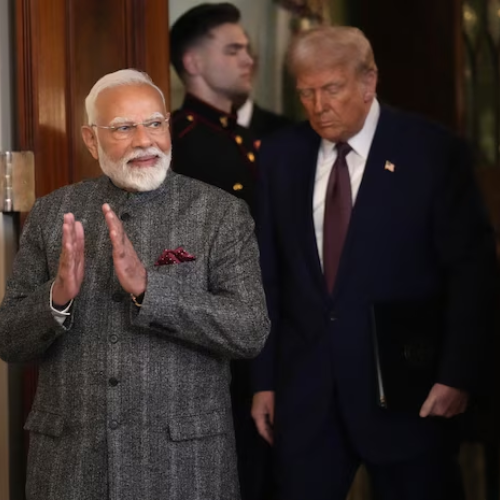In a move termed as trade tsunami, set to upend international trade dynamics, President Donald Trump has declared an aggressive plan to impose reciprocal tariffs on India and other nations he accuses of exploiting the United States with exorbitant duties. This bold strategy, unveiled during the swearing-in of Commerce Secretary Howard Lutnick, takes direct aim at economic giants like India and China, signaling a seismic shift in U.S. trade policy.
A Tsunami of Tariffs
“We’ll soon impose reciprocal tariffs because that means, they charge us, we charge them. It’s very simple,” Trump announced, his tone leaving no room for negotiation. He specifically called out India and China, emphasizing that the era of one-sided trade benefits at America’s expense is over. “Whatever a company or a country—such as, let’s say, India or China—charges us, we want to be fair… so reciprocal. Reciprocal meaning, ‘they charge us, we charge them.'”
Trump’s words signaled an impending tsunami of tariffs, a sweeping wave of trade measures that could reshape global economic dynamics. The message was clear—nations that imposed heavy duties on American goods should brace for an equal and opposite reaction, a tidal shift in trade policy unlike anything seen before.
Targeting India: The “Tariff King”
India, often labeled by Trump as the “tariff king,” stands at the forefront of this trade offensive. The President has repeatedly criticized India’s steep import duties, such as the staggering 100% tariff on certain U.S. motorcycles. In a candid recount of his conversation with Indian Prime Minister Narendra Modi, Trump stated, “I told Prime Minister Modi yesterday—he was here—I said, ‘Here’s what we’re going to do: reciprocal. Whatever you charge, I’m charging.'” This direct confrontation underscores the administration’s resolve to dismantle what it perceives as unfair trade barriers.
Election Scandal: Trump Slams $21M U.S. Funding for India’s Voter Turnout
Implications for Global Trade
The ramifications of this policy are poised to reverberate across the global economy. Nations benefiting from trade surpluses with the U.S. may face significant economic upheaval as their exports become less competitive in the American market. Industries reliant on the U.S. consumer base could experience declining sales, leading to potential job losses and economic contraction. Conversely, American consumers might encounter higher prices on imported goods, fueling inflationary pressures.
Sanctions Fallout: Russian Energy Official Defends Oil Trade with India
Domestic Repercussions
Within the U.S., reactions are mixed. Domestic manufacturers applaud the move, anticipating a more level playing field and a resurgence in American industry. However, sectors dependent on global supply chains express concern over rising production costs and potential retaliatory measures from trade partners. Economists warn of a possible trade war, cautioning that such conflicts historically lead to economic downturns.
This aggressive stance marks a tsunami of protectionism, challenging decades of globalization and free trade principles. By enforcing reciprocal tariffs, the Trump administration aims to renegotiate trade relationships, compelling other nations to lower their tariffs or face restricted access to the lucrative U.S. market. This high-stakes strategy seeks to rectify trade imbalances but risks triggering a tsunami of retaliation, potentially destabilizing the global economy.
US Sanctions Shake India Russia Iran Oil Trade Amid Growing Tensions
A New Era of Protectionism
Retaliatory tariffs against india is just one example. President Trump’s declaration of reciprocal tariffs represents a watershed moment in international trade relations. As the U.S. moves to implement these measures, the global community braces for a period of economic uncertainty and recalibration. The effectiveness of this policy in achieving fair trade remains to be seen, but its immediate impact is unmistakable: the rules of global commerce are being rewritten, and nations must navigate this new landscape with caution and strategic foresight.


